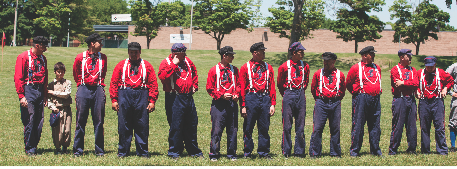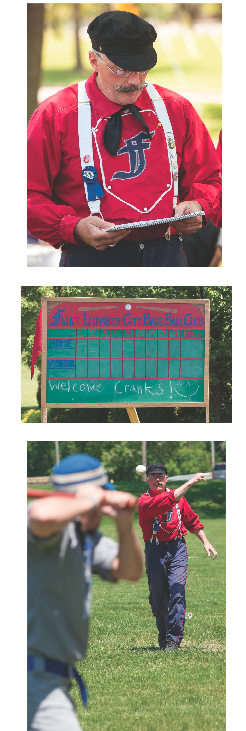
Baseball is a nostalgic sport: the pace and traditions of the game, unlike the frenetic crash of bodies in American football, are reminiscent of a time long past. In Flint, those who wish to experience true old-time baseball can enjoy a vintage game played by the Lumber City Base Ball Club.
 While the modern game is associated with equipment such as baseball gloves, batting helmets and the “traditional” sliding shorts, as well as inebriated spectators, vintage baseball is a game for gentlemen. This version of the game is played by the slogan, “no gloves, no strikes [and]no swearing.” Founded on the principles of good sportsmanship, gentlemanly conduct and camaraderie, vintage baseball is a far less competitive sport than its modern descendant. Swearing is not allowed because women attend these games and players must be considerate of the “polite company.” Additional rules included no playing on Sundays, and the strict prohibition of alcohol consumption.
While the modern game is associated with equipment such as baseball gloves, batting helmets and the “traditional” sliding shorts, as well as inebriated spectators, vintage baseball is a game for gentlemen. This version of the game is played by the slogan, “no gloves, no strikes [and]no swearing.” Founded on the principles of good sportsmanship, gentlemanly conduct and camaraderie, vintage baseball is a far less competitive sport than its modern descendant. Swearing is not allowed because women attend these games and players must be considerate of the “polite company.” Additional rules included no playing on Sundays, and the strict prohibition of alcohol consumption.
The city of Flint is no stranger to historical baseball clubs. In fact, several were formed in this area between 1860 and 1870. The Hercules Club, The Genesee Wolverines, The Flint Ogemaws and The Independents, as well as the Lumber City Base Ball Club were just a handful of those created in Flint. Two years ago, Dr. Thomas Henthorn of UM-Flint resurrected the spirit, passion and sportsmanship of the teams of the past and reinitiated The Lumber City Base Ball Club. Today, it is an ongoing project between the UM-Flint’s History department and the Whaley Historic House Museum. As the Wyatt Professor of U.S. History, Henthorn’s duty is to spearhead civic engagement and public scholarship, and he says the Lumber City project does just that. “This is how we can engage the community and draw people to campus,” said Henthorn enthusiastically.
Vintage baseball is played by the book: Haney’s Base Ball Book of Reference, that is, first published in 1866. When the ball is pitched, it has to pass below the pitcher’s waist. A batter can request a “high ball,” wherein the striking zone of the baseball extends from a batter’s shoulder to their waist, a “low ball,” ranging from the batter’s waist to their knees. A strike is only called if the batter takes a swing at the ball and misses. Umpires do not make all the calls of the game; much is left to the players to use their own judgment about what is fair play. A ball is considered “out” if and when a player strikes out, if the baseball is caught in midair or on the first bounce in foul territory. In addition to these rules, a player can request a teammate to run the bases for them, but the runner must wait to run until they are signaled by the umpire.

As the reincarnation of The Lumber City Base Ball Club of 1870, the team is devoted to authenticity in recreating every aspect of vintage baseball. Not content to merely play according to the old rules, each player wears long pants as part of their uniform, complete with suspenders. Rather than helmets, players wear caps similar to the style worn by a turn-of-the-century newsboy. Additionally, players don’t use gloves, but instead catch with their bare hands. Lumber City meets on the lawn of the William S. White Building at UM-Flint, a perfect location to preserve the game’s authenticity, because vintage games are played in an open green space, not on a baseball diamond.
 America’s favorite pastime has been preserved in its original form in the Lumber City Base Ball Club, and this project not only helps to preserve the historical value of baseball, but the historical value of Flint, as well. “This is a positive thing in the community and is an interesting way to engage history and sports,” said Henthorn. And for those who are wondering, Henthorn reports, “Catching a baseball with your bare hands does hurt.”
America’s favorite pastime has been preserved in its original form in the Lumber City Base Ball Club, and this project not only helps to preserve the historical value of baseball, but the historical value of Flint, as well. “This is a positive thing in the community and is an interesting way to engage history and sports,” said Henthorn. And for those who are wondering, Henthorn reports, “Catching a baseball with your bare hands does hurt.”














